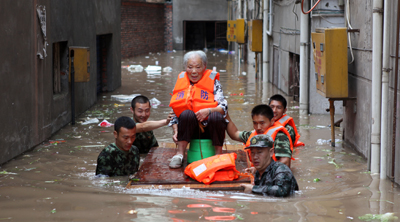New York, July 24, 2012–A year after drawing public ire for censoring coverage of a high-speed train crash, Chinese authorities should allow journalists to freely cover the aftermath of Saturday’s deadly flooding in and around the capital, the Committee to Protect Journalists said today. International news accounts said 37 people died in Beijing and up to 100 people nationwide.
International news reports said that Chinese propaganda officials were urging domestic journalists to report positive stories that focused on effective disaster relief–just as they did after last year’s crash. On July 23, 2011, an express train crashed in the city of Wenzhou, killing 39 people, according to news reports. Authorities had attempted to censor coverage of the wreck, which infuriated journalists and Internet users, according to CPJ research.
“When the government ordered journalists to report positively on last year’s Wenzhou train crash, it unleashed angry calls for accountability,” said Bob Dietz, CPJ’s Asia program coordinator. “That experience shows that citizens demand government transparency in times of crisis, an expectation authorities should meet in their response to the flooding.”
Censors deleted microblog updates on the floods, including 72,000 posts criticizing the government’s call for donations to fix damaged municipal sewers and drainage systems that had contributed to the disaster, according to Agence France-Presse.
Microblogs like Sina Weibo have facilitated swift, often critical reporting of disasters like the 2011 Wenzhou train crash–despite censors efforts to restrict it, according to CPJ research.
- For more data and analysis on China, visit CPJ’s China page here.
